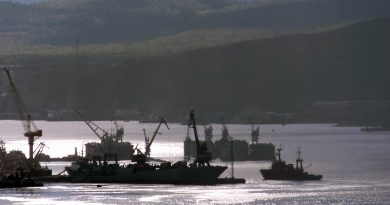Blog: The Arctic is not just an earmark for Alaska says senator

U.S. Senator Lisa Murkowski (R-Alaska) gave a speech at the 6th Symposium on the Impacts of an Ice-Diminishing Arctic on Naval and Maritime Operations in Washington, D.C.
The U.S. National Ice Center (NIC) and the U.S. Arctic Research Commission co-hosted the biennial event, which the website describes as covering topics related to U.S. naval operations and national strategy in an “ice-free Arctic.” Ice-diminishing or ice-free, it’s apparent that symposium organizers have come to the conclusion that the ice is basically going, going, gone. Such a situation, of course, would be a best-case scenario for the handful of shipping companies interested in opening trans-Arctic shipping routes and a worst-case scenario for the indigenous peoples who have traditionally relied on sea ice for hunting and transportation.
Focus on naval and shipping operations
The future of Arctic indigenous peoples, however, did not constitute the focus of this symposium. Over its three-day duration, politicians, oceanographers, atmospheric scientists, naval and coast guard representatives, and lawyers spoke about the region (the program is available here). A representative from ExxonMobil did, too. Steven Laws, supervisor of development planning in the Arctic, presented the National Petroleum Council’s Arctic Study Report. The transcript of Laws’ speech is not available online, but the report, which thinks the Arctic can contribute to U.S. and global energy supplies and that the technology is already in place to make this happen, can be downloaded here.
When Senator Murkowski spoke, she did not mention oil or gas. Instead, she focused on naval and shipping operations. Interestingly, she suggested that in the Arctic, the United States “has a strategic geographic advantage that no other nation can match.” To support her claim, she explained,
On one side of the Arctic is the Bering Strait: a chokepoint for trans-Arctic activity as the only maritime route between the Pacific and the Arctic. On the other side of the Arctic are three routes to the Atlantic – off of Norway, between Iceland and Greenland, and between Greenland and Canada, with Maine positioned just to the south.
U.S. and the Arctic
With these words, Murkowski essentially tried to square the circle. The Arctic is a roughly circle-shaped ocean, but Murkowski instead gave it two sides: one facing Alaska, and the other facing Maine. In this envisioning, the U.S. therefore seems to surround the Arctic on all sides – even though Russia actually possesses coastline facing almost half of the Arctic Ocean. In order for the squaring of the Arctic to work, Murkowski has to enlist Maine, which is increasingly inserting itself into Arctic affairs in the U.S. In the Senate, Murkowski and Senator Angus King (I-Maine) have formed an Arctic Caucus to try to bolster the Arctic’s stance as an issue of national, rather than peripheral, importance. Murkowski declared in her speech, “We need to move beyond the notion that an “Arctic” project is just an earmark for Alaska.”
The Senator and others at the conferences might have also reminded that the Arctic is not just a “project” to be undertaken by a slew of scientists, politicians, naval officers, and businessmen from the Arctic and beyond who collectively aspire to the region’s resources and transportation shortcuts. It is also a homeland for millions of people with different ways of life and a vast amount of wildlife, from the magnanimous polar bear to bright orange lichen. But the view of the Arctic as an almost-blank slate, a place to roll out a region-wide project of investment, infrastructure, and innovation, is pervasive.
‘Two Arctics’
Last autumn, speaking at the Arctic Circle conference in Reykjavik, Iceland, Murkowski mentioned how there are two Arctics: one with infrastructure (the Nordic countries) and one without it (Alaska, Russia, and Greenland). This is undoubtedly crippling for many of the people in the have-not countries that have received some, but not all, of the benefits of modernity, like a half-fulfilled (or rather half-baked, now that the Arctic is melting) promise. But ironically, the increasing impossibility of continuing traditional ways of life in an ice-diminishing and potentially ice-free Arctic has ironically given new impetus – and, in many circles, legitimization – to the “project” of the Arctic as a means of enriching and empowering peoples deprived by past rounds of industrialization.
The full text of Senator Murkowski’s speech is available here, and a video is available here.
Related stories from around the North:
Asia: Asia ahead on preparing for polar climate change, says U.S. Arctic rep, Eye on the Arctic
Canada: The Arctic Council – What was accomplished and where we go from here, Eye on the Arctic
China: China’s silk road plans could challenge Northern Sea Route, Blog by Mia Bennett
Finland: US seeks Finnish support for Arctic goals, Yle News
Norway: China eyes Arctic Norway infrastructure projects, Barents Observer
Russia: The Arctic Council’s Immunity to Crimean Flu, Blog by Heather Exner-Pirot
Sweden: Arctic Council – From looking out to looking in, Blog by Mia Bennett, Cryopolitics
United States: Arctic Alaska meeting planned for Kerry, Lavrov and other officials, Alaska Dispatch News




